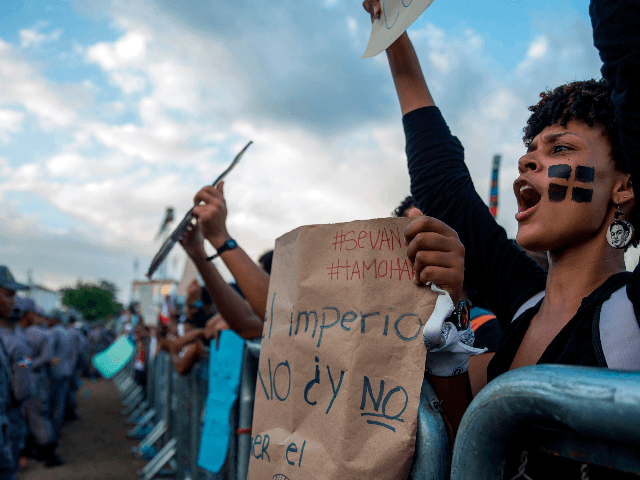Dominican armed forces hurled tear gas canisters at protesters congregated before Santo Domingo’s Central Electoral Board (JCE) on Tuesday, alarming a largely peaceful crowd united to demand free and fair elections after the JCE abruptly canceled the results of this weekend’s national polls.
The JCE announced, while thousands nationwide were still on lines to vote, that Sunday’s municipal elections would be canceled. Polls had opened for only four hours before the cancelation. The Dominican Republic had purchased and launched for the first time the use of electronic software to tally votes in some of the nation’s most populous cities. The software reportedly failed to show candidates for major opposition parties, making it impossible for supporters to vote for them.
Amid calls for every member of the JCE to resign, the oversight body has refused to replace any of its members. It has since rescheduled the elections for March 15 and launched an investigation into the matter. On Wednesday, electoral authorities claimed they had found evidence of “sabotage” in the software malfunction.
Thousands of protesters, mostly young people, have assembled outside of the JCE headquarters in the capital on a nightly basis. Many were waving flags and holding signs reading “we live in a dictatorship disguised as a democracy,” “what about my future,” and other slogans. Many also banged on pots and pans, a common protest activity in Latin America, to call for the removal of everyone on the JCE and safeguards to the legitimacy of the next vote. A group of protesters brought a fake casket with the word “democracy” written on it as a sign of protest.
There were no significant reports of violence by protesters. Following the protests, those assembled took the time to pick up litter and clean up the plaza outside of the JCE, putting trash into organized trash bags. Protesters have directed their ire squarely at the electoral commission and actively urged each other to show respect to authorities, particularly local police stationed near protest centers to keep the peace. Somos Pueblo, an Instagram account run by members of the protest movement, published a video of what appeared to be a municipal police officer fainting. The account claimed that military police and federal officials were forcing local police to work onerous hours and depriving them of food and water.
“Support the police who go to the protest in front of the board, bring them water and food, they are also suffering the abuses of the system,” the caption on the video read. “National police and the military are not feeding them or giving them water, yesterday one of them fainted at the protest.”
Despite the lack of threatening activity, late on Tuesday, military police officials deployed tear gas against the crowd, sending the largely young assembly into a panic.
According to the country’s Diario Libre newspaper, the nation’s military police initially distanced themselves from the tear gas and claimed that “unknown” individuals had launched it. By Wednesday, Minister of Defense Rubén Paulino Sem had confirmed that the individual responsible for the tear gas was an armed forces soldier and that he would be fired once confirmed to be the culprit.
The attack did not appear to weaken the strength of the protests on Thursday, which appeared to again bring together large crowds demanding the resignation of those responsible.
The head of the electoral board, Julio Cesar Castaño Guzmán, refused to resign in a press conference Wednesday but did express shame.
“When something doesn’t go well, one should be quiet and ask for forgiveness,” Castaño told reporters. “When one fails, one should recognize it and ask for forgiveness and that is what there is, there was a failure. Not to defend myself, but what I was told was that this problem … was simple and easily fixed, well I guess we found out that wasn’t the case.”
Castaño refused to resign.
“I have heard other voices: ‘resign, get out of there.’ That is also the easiest thing, and the most despicable and miserable, bceause that is a way of not assuming responsibility,” he told reporters. “The way to leave here is through impeachment over a grave fault. And whoever feels they have to move forward with that can go to the House of Representatives and proceed, and fast.”
He added that the members of the JCE felt “as if someone had died.”
Senior national police officials have said they have found evidence of “sabotage,” not mechanical error, in why opposition parties did not appear on the software ballot. National police spokesman Frank Durán said on Wednesday that they had identified the “principal actors” involved in the alleged sabotage in addition to the two known suspects: Manuel Antonio Regalado, a technician working on the software, and Col. Ramón A. Guzmán Peralta.
“Both Col. Ramón A. Guzmán Peralta and technician Manuel Antonio Regalado not only had information on the activity described, but also spoke to and collaborated with the suspected principal actors to such a degree that the technician claimed he was present at the moment of the act,” the spokesman claimed.
Dominican media have fixated on a third individual involved in the situation: Col. Koji Maruyama Maruyama, known commonly as “the Asian,” who had control of the fiber optic network used for the elections while people were voting. Authorities have confirmed that Maruyama was in charge of all of the voting software while the election took place, but claimed that, after interrogating him, they had no evidence to detail him or consider him a suspect.

COMMENTS
Please let us know if you're having issues with commenting.